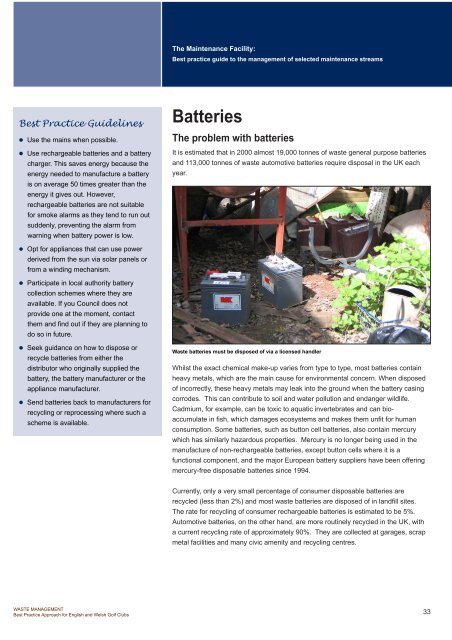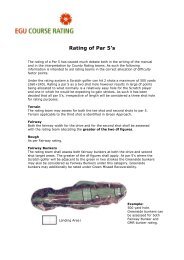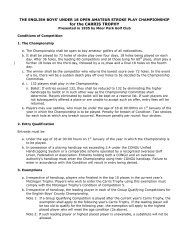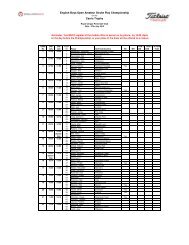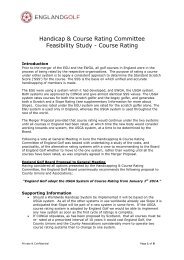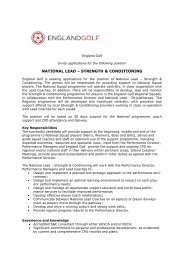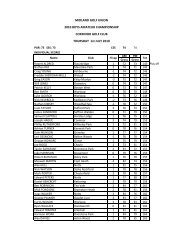Waste management - England Golf
Waste management - England Golf
Waste management - England Golf
Create successful ePaper yourself
Turn your PDF publications into a flip-book with our unique Google optimized e-Paper software.
The Maintenance Facility:<br />
Best practice guide to the <strong>management</strong> of selected maintenance streams<br />
Best Practice Guidelines<br />
Use the mains when possible.<br />
Use rechargeable batteries and a battery<br />
charger. This saves energy because the<br />
energy needed to manufacture a battery<br />
is on average 50 times greater than the<br />
energy it gives out. However,<br />
rechargeable batteries are not suitable<br />
for smoke alarms as they tend to run out<br />
suddenly, preventing the alarm from<br />
warning when battery power is low.<br />
Batteries<br />
The problem with batteries<br />
It is estimated that in 2000 almost 19,000 tonnes of waste general purpose batteries<br />
and 113,000 tonnes of waste automotive batteries require disposal in the UK each<br />
year.<br />
Opt for appliances that can use power<br />
derived from the sun via solar panels or<br />
from a winding mechanism.<br />
Participate in local authority battery<br />
collection schemes where they are<br />
available. If you Council does not<br />
provide one at the moment, contact<br />
them and find out if they are planning to<br />
do so in future.<br />
Seek guidance on how to dispose or<br />
recycle batteries from either the<br />
distributor who originally supplied the<br />
battery, the battery manufacturer or the<br />
appliance manufacturer.<br />
Send batteries back to manufacturers for<br />
recycling or reprocessing where such a<br />
scheme is available.<br />
<strong>Waste</strong> batteries must be disposed of via a licensed handler<br />
Whilst the exact chemical make-up varies from type to type, most batteries contain<br />
heavy metals, which are the main cause for environmental concern. When disposed<br />
of incorrectly, these heavy metals may leak into the ground when the battery casing<br />
corrodes. This can contribute to soil and water pollution and endanger wildlife.<br />
Cadmium, for example, can be toxic to aquatic invertebrates and can bioaccumulate<br />
in fish, which damages ecosystems and makes them unfit for human<br />
consumption. Some batteries, such as button cell batteries, also contain mercury<br />
which has similarly hazardous properties. Mercury is no longer being used in the<br />
manufacture of non-rechargeable batteries, except button cells where it is a<br />
functional component, and the major European battery suppliers have been offering<br />
mercury-free disposable batteries since 1994.<br />
Currently, only a very small percentage of consumer disposable batteries are<br />
recycled (less than 2%) and most waste batteries are disposed of in landfill sites.<br />
The rate for recycling of consumer rechargeable batteries is estimated to be 5%.<br />
Automotive batteries, on the other hand, are more routinely recycled in the UK, with<br />
a current recycling rate of approximately 90%. They are collected at garages, scrap<br />
metal facilities and many civic amenity and recycling centres.<br />
WASTE MANAGEMENT<br />
Best Practice Approach for English and Welsh <strong>Golf</strong> Clubs<br />
33


